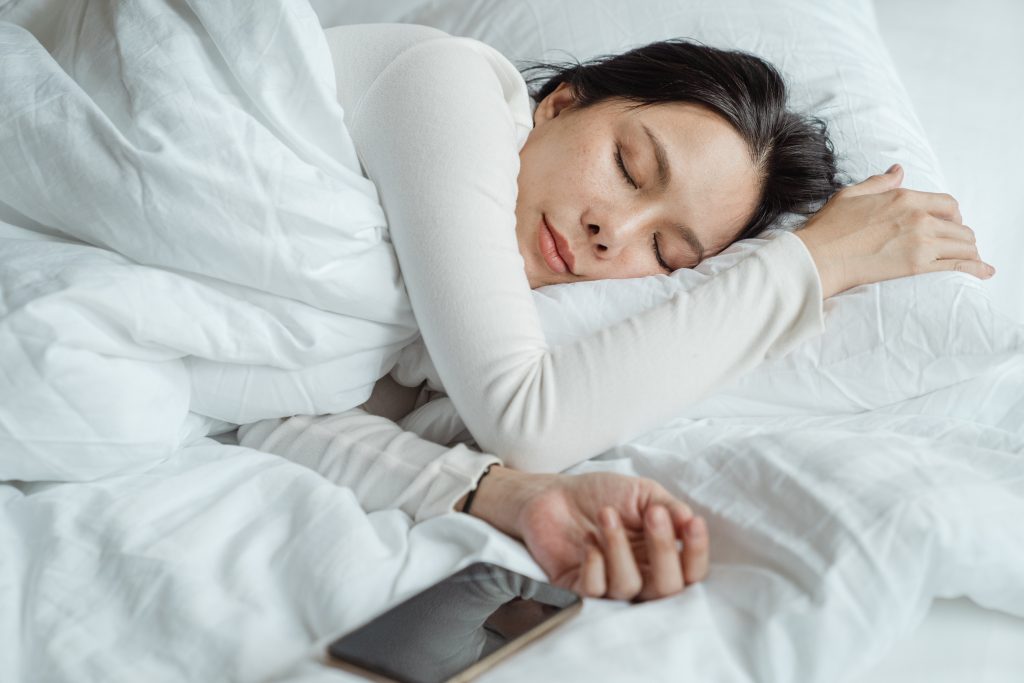By Stephanie, Slaapdeskundige
Are dark circles under your eyes the new normal? ‘Broken nights are just part of it’ — who hasn’t heard that old chestnut before? And then there’s ‘babies sleep like a baby’?
So, if both are so normal, how do these two things go together? Of course, if all goes well, you see babies asleep more than awake in the first stage of their early life.
But what people don’t tell you is: not only is that postpartum sleep not continuous and that day just skips into night, but your own sleep structure also changes enormously in the postpartum phase. How about that?

Hormonal changes
New mothers sleep differently to the average person. Now, there’s no ‘normal’ way of sleeping, especially for a mother. However, the big difference for a postpartum mother comes from the body. The hormones that ruled your body for 40 weeks during pregnancy have left in one fell swoop to make way for a new order — a new order which doesn’t happen overnight. Until things settle, you have a kind of vacuum in which progesterone and estrogen fail. These hormones (alongside your sleep hormone, of course) determine every aspect of your sleep.
• Estrogen increases dream sleep. If estrogen drops (such as after childbirth), it can have a negative impact on both REM sleep and sleep quality.
• Progesterone promotes drowsiness and deep recovery sleep. After birth, your progesterone levels decrease, too, leading to poor quality, restless sleep.
• Both hormones regulate the neurotransmitter systems in the brain responsible for sleep quality. Therefore, the massive drop in hormone levels after childbirth brings significant sleep disruptions.
How frustrating, especially in times when your little miracle needs night feedings and has no regular sleep pattern either. Is this really what Mother Nature — a mum herself, of course — intended? Fortunately not!
Mothers are adaptive. If something isn’t there, we’ll find a way around it. And in this case, Mother Nature has devised a quick fix: breastfeeding! Breast milk contains prolactin, which is sleep-inducing for both mother and child — so two birds, one stone, you could say. Of course, this is only the case if you are breastfeeding, which not all mothers can or choose to do.
A new kind of sleep
And it doesn’t stop there — every aspect of sleep is different in the postpartum phase. Under the notion of “if you have less of it, you’d better do the most important things first,” a new mother skips the light sleep phase and experiences more of the dream and deep sleep phases. So even if you end up with fewer sleeping hours in a day, the sleep you do get really counts!
Then everything seems to be in order, right? Babies sleep a lot (even if it is interrupted). Meanwhile, you also sleep differently, so you don’t lack the deep sleep benefits.
Unfortunately, there is a catch. Short-term, perhaps it’s okay. However, if your birth was physically or mentally difficult, if your baby doesn’t sleep much, or if the newborn behaviour continues for months, your altered sleeping pattern can take its toll. After all, there is a reason we sleep in several phases. And, longer-term, you really need that light sleep as much as the deeper REM phase.
Sleeping is also a matter of habit. Down the line, many a mother finds herself lying awake while the apple of her eye is sleeping sweetly. In fact, a recent Norwegian study showed that this occurs more often than we might think. At least 41 per cent of women in the study still had insomnia two years after giving birth. Normally, only 10-15 per cent of women experience insomnia. This finding highlights how much the postpartum phase influences sleep and how ‘postpartum’ really is more than just those first couple of months after birth.
What makes postpartum sleep different?
So what is it that makes postpartum sleep different from ‘normal’ sleep?
- Well, firstly, you have less of it — at least two hours a day less.
- The sleep you get is interrupted.
- Sleep quality is different, thanks to the plummeting of the hormones progesterone and estrogen, as well as your sleep and wake hormones.
You also develop a completely different classification of sleep! This new view of sleep is partly down to your hormone disruptions. However, the fact your newborn miracle has a tummy the size of a walnut and no regular 24-hour rhythm, also plays a role.
Tips for better sleeping

Routine
In times of chaos, you want regularity. Your body likes predictability, and that’s exactly what brings you sleep. The same goes for your meals and getting a portion of fresh air and sunlight in the morning hours. Setting a routine with this can help you get your and your baby’s body clocks in sync.
Need a pick-me-up? Then you want to get those first hours of sleep at the same time every night. Try not to go to bed too late, either.
Your baby can really go a few (2-3) hours without feeding in the night. Or perhaps your partner can feed them with a bottle. Ultimately, you recover faster when you get to your deep sleep!
Napping
If your night was short, grab a daytime power nap. However, it’s best not to sleep too late in the afternoon or to sleep for too long in one go. A short nap (20 minutes) brings you to the right part of the sleep phase, whereas a longer nap (at least 90 minutes) takes you through a full sleep cycle.
“Sleep when your baby is asleep” is definitely a good rule to abide by.
Don’t sleep in
Lie-ins bring you ‘crappy sleep’ because you disrupt your biological rhythm and end up in the sleep phases you don’t currently have a shortage of.
As tempting as sleeping in might be, it’s more beneficial to go to bed earlier or take that power nap during the day.
Lighting
Lighting can affect your sleep, too. Bright or white light prevents you, your little one, and your partner, from falling asleep quickly. You might like to try a soft orange or red light instead to encourage drowsiness.
Prepare before bed
Make bedtime easier for yourself. Before you settle down, prepare everything you might need in the night. It’s helpful to move everything you think you may need into your bedroom. This will save you from walking up and down the stairs or to and from the bathroom (which can wake everyone else up again too).
Better sleep
Then don’t mess around! See if you can get yourself into a regular sleeping routine.
With better sleep, you can be the best version of yourself. And remember, your little one will benefit from that, too!

Stephanie is a renowned baby-toddler-child-teenager and parent sleep expert. She is the author of 10 books and the founder of the “droomritme” method with which she has trained more than a hundred child sleep coaches in the Netherlands! For more information, visit her webiste here.
Together with Mark Schadenberg, she has set up a special coaching for parents. Sleep Parents Sleep is all about: postpartum sleep; getting more out of your sleep (smart sleep); and how to survive if your little one isn’t sleeping well (yet). Take a look at Slaapoudersslaap.nl for more information.
Related article: let’s talk about postpartum!






Add comment